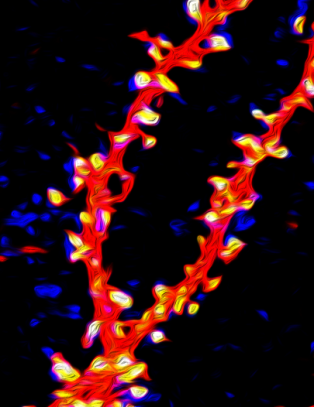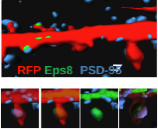Menna Elisabetta
 Research scientist
Research scientist
URT c/o Humanitas Research Hospital
Via Manzoni 56
20089 Rozzano
Questo indirizzo email è protetto dagli spambots. È necessario abilitare JavaScript per vederlo.
Skype: elisabetta.menna
From filopodia to synapses:the cell biology of neuronal wiring
Research summary
The main interest of the laboratory is to study the mechanisms involved in the formation and function of the synapse -the central element that allows the communication between neurons in brain- and in defining how these processes get wrong in brain diseases. A lot of recent evidence has indicated that several brain disorders, like epilepsy, schizophrenia and autism, but also Alzheimer’s disease, depend on a bad functioning of the synapse. In recent years we demonstrated that the capping protein Eps8 plays a crucial role in dendritic spine formation and plasticity and is reduced in brain of patients affected by autism. Moreover given inflammation and immune molecules have been recognized as important contributors to CNS injury we aim to define whether pentraxin3, which is a molecule of innate immunity whose expression is increased in epilepsy, may affect synaptic protein networks and function.



Representative publications
Antonucci F, Corradini I, Morini R, Fossati G, Menna E, Pozzi D, Pacioni S, Verderio C, Bacci A, Matteoli M.
Reduced SNAP-25 alters short-term plasticity at developing glutamatergic synapses. EMBO Rep. 2013 Jul;14(7):645-51. doi: 10.1038/embor.2013.75.
Menna E, Zambetti S, Morini R, Donzelli A, Disanza A, Calvigioni D, Braida D, Nicolini C, Orlando M, Fossati G, Cristina Regondi M, Pattini L, Frassoni C, Francolini M, Scita G, Sala M, Fahnestock M, Matteoli M.
Eps8 controls dendritic spine density and synaptic plasticity through its actin-capping activity. EMBO J. 2013 Jun 12;32(12):1730-44. doi: 10.1038/emboj.2013.107. Epub 2013 May 17.
Gelsomino G, Menna E, Antonucci F, Rodighiero S, Riganti L, Mulle C, Benfenati F, Valtorta F, Verderio C, Matteoli M.
Kainate induces mobilization of synaptic vesicles at the growth cone through the activation of protein kinase A. Cereb Cortex. 2013 Mar;23(3):531-41.
Menna E, Fossati G, Scita G, Matteoli M (2011)
From filopodia to synapses: the role of actin-capping and anti-capping proteins. Eur. J. Neurosci. 34:1655-62.
Vaggi F, Disanza A, Milanesi F, Di Fiore PP, Menna E, Matteoli M, Gov NS, Scita G, Ciliberto A (2011)
The Eps8/IRSp53/VASP network differentially controls actin capping and bundling in filopodia formation. PLoS Comput. Biol. 7:e1002088.
Menna E, Disanza A, Cagnoli C, Schenk U, Gelsomino G, Frittoli E, Hertzog M, Offenhauser N, Sawallisch C, Kreienkamp HJ, Gertler FB, Di Fiore PP, Scita G, Matteoli M (2009)
Eps8 regulates axonal filopodia in hippocampal neurons in response to brain-derived neurotrophic factor (BDNF). PLoS Biol. 7:e1000138.











